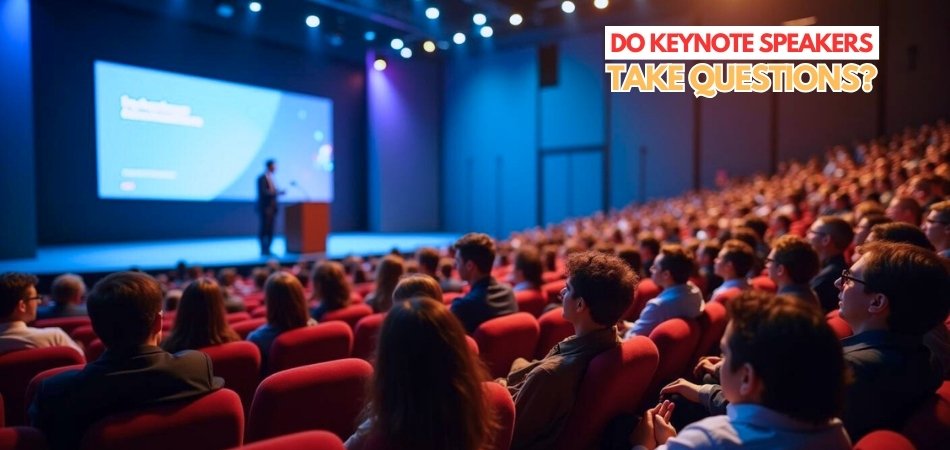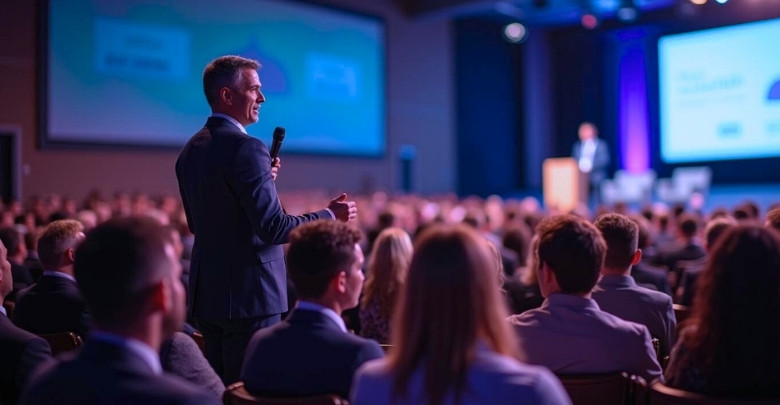Keynote presentations draw audiences with expert insights, energize events with fresh ideas, and leave participants excited for more. The power they possess to shape conversations and inspire action is unmatched. They bring together people eager to hear more about what the speaker has to say. But the question is, do keynote speakers take questions?
Yes, keynote speakers do take questions during structured Q&A sessions after their presentations, often moderated to ensure relevance. Through this interaction, participants will get deeper insights, and opportunities to make valuable connections.
In addition, informal discussions may occur during breaks or networking events. However, some events might skip Q&A due to time constraints, offering alternative ways to ask questions. If you are curious to learn more? Stay tuned for an in-depth look at how to maximize keynote experiences.
Do Keynote Speakers Take Questions: What to Expect?
Keynote speeches are captivating moments at any event, providing audiences with insights, inspiration, and food for thought. Naturally, many attendees wonder: do keynote speakers take questions? In most cases, the answer is yes! A structured Q&A session or informal discussion often follows keynotes, allowing participants to engage meaningfully. Here’s what to expect from a keynote speaker’s question session:
Expect Structured Q&A Sessions
After a keynote speech, many events host moderated Q&A sessions where attendees can pose questions directly to the speaker. These sessions are designed to keep the interaction relevant, ensuring the speaker addresses key points raised during the presentation. Moderators also help streamline the process, allowing the audience to gain deeper insights efficiently.
Attending a structured Q&A is a fantastic way to clarify complex ideas or ask about specific challenges in your field. These sessions often add immense value to the event, complementing the presentation. For instance, if you attend any conferences in Canada, you might notice how well-organized such interactions often are.
Look for Informal Networking Opportunities
Outside formal sessions, networking events or coffee breaks offer a chance to chat with keynote speakers in a relaxed setting. These interactions are more casual, allowing for organic conversations without time pressures. Many find these informal exchanges more engaging and less intimidating.
Whether at a networking mixer or during a break, seize opportunities to approach the speaker thoughtfully. Keep your questions concise and respectful to encourage meaningful exchange. Such moments often lead to valuable connections and unexpected insights.
Understand When Q&A May Be Skipped
In some cases, Q&A sessions might be skipped due to time constraints or tight event schedules. Instead, organizers may offer alternative ways to engage with the speaker, such as written questions. Social media platforms or event apps are often used to facilitate post-presentation interactions.
While it can be disappointing to miss live Q&A, these alternatives still provide valuable opportunities for engagement. Embrace these options to ensure your questions are addressed. Following up with written queries often leads to well-thought-out responses from the speaker.
Prepare for Moderation During Q&A
Moderators play a crucial role in making Q&A sessions seamless and effective for both the speaker and the audience. They curate questions to prioritize relevance, avoiding overly broad or off-topic inquiries. This helps ensure that the discussion remains productive and engaging for everyone.
When preparing your question, consider the event’s theme and how it ties into the speaker’s expertise. A well-crafted query is more likely to capture the moderator’s attention. Thoughtful questions make the session richer and more rewarding for all.
Be Ready for Alternative Formats
Some events explore innovative ways to handle questions, such as audience polling or live comment feeds displayed on screens. These methods encourage broad participation, ensuring diverse perspectives and ideas are heard. Many attendees find these formats more inclusive and dynamic.
Participating in alternative formats requires quick thinking and concise communication, as opportunities to contribute may be limited. Be attentive during the event to make the most of these systems. Whether traditional or modern, every method aims to bridge the gap between the speaker and the audience.
Why Do Keynote Speakers Value Audience Questions?
Keynote speakers bring expertise, energy, and inspiration to events, but the true magic happens when they connect with their audience. One of the most meaningful ways they achieve this is by engaging with questions. This interaction fosters mutual understanding and leaves attendees feeling heard and valued. Let’s explore why keynote speakers cherish these moments.
Encourages Deeper Engagement
Questions from the audience reflect a genuine interest in the speaker’s insights and allow the conversation to go beyond the surface. Speakers see this as proof their ideas resonate with the audience’s unique experiences. Addressing queries keeps the discussion dynamic and relevant, creating more memorable takeaways. For speakers, these exchanges bring their messages closer to the audience’s needs.
Provides Feedback on Ideas
When attendees ask questions, they inadvertently share their thoughts, reactions, and concerns about the keynote’s content. This feedback helps speakers refine their presentations and understand audience priorities. It becomes an invaluable learning tool for improving future talks or adapting messages to specific industries. Through this process, they continuously grow as communicators.
Builds Authentic Connections
Answering audience questions creates a two-way dialogue that builds trust and rapport between speakers and attendees. This interaction humanizes the speaker, making them approachable and relatable to the audience. Authentic connections are formed when speakers take time to listen and respond thoughtfully. These moments often leave a lasting impression long after the event.
Enhances Audience Learning
Audience questions often dive into specifics or explore alternative perspectives that may not have been covered during the presentation. This enriches the learning experience for everyone present, adding practical examples or clarifying complex points. Speakers value this chance to deepen their impact by addressing real-world concerns. Their answers often provide actionable insights for attendees.
Inspires Future Content
Questions inspire speakers to explore new topics, ideas, or perspectives they might not have considered before. Audience curiosity highlights trends or emerging challenges that could shape future speeches, books, or research. This inspiration keeps their content fresh and relevant to diverse audiences. Speakers treasure these interactions as creative fuel for their work.
Strengthens Event Success
When speakers engage with audience questions, they contribute to the overall success and value of the event. Interactive discussions enhance the event’s reputation by creating a vibrant atmosphere of collaboration and learning. For organizers, this ensures attendees leave with a positive impression of both the speaker and the event. The Q&A session becomes a hallmark of a memorable experience.
Can You Ask Questions Directly to Keynote Speakers?
Yes, you can often ask questions directly to keynote speakers during designated sessions or informal networking opportunities. Many events include structured Q&A sessions where attendees can engage with speakers and seek clarifications. These sessions allow speakers to elaborate on key points or address audience-specific concerns.
However, some events skip live Q&A due to time limits or logistical constraints, offering other engagement methods instead. During a conference style presentation, speakers often answer audience questions to enhance interaction and relevance. Informal opportunities, like coffee breaks or networking sessions, provide additional chances for personal discussions with keynote speakers.
Preparing thoughtful, concise questions beforehand helps you make the most of these valuable interactions. Whether formal or informal, engaging with a speaker provides deeper insights and valuable connections.
Tips to Prepare Questions for Keynote Speaker Q&As?
Asking thoughtful questions during a keynote Q&A session can enhance your learning and make the experience more engaging. Good questions show your interest, deepen the discussion, and even help others learn more. Here are some practical tips to help you prepare effectively:
- Research the Speaker’s Background: Look into the speaker’s expertise, past work, and accomplishments. Knowing their perspective helps you ask insightful and relevant questions.
- Understand the Presentation Topic: Learn about the themes and key points of the keynote presentation. This understanding helps you formulate meaningful questions to discuss.
- Focus on Key Insights: Identify the core ideas or arguments shared by the speaker. Craft questions that build upon these to encourage detailed responses.
- Be Clear and Specific: Avoid vague or overly broad queries that lack focus. Direct, specific questions are easier for the speaker to address thoroughly.
- Choose Open-Ended Questions: Choose questions that require explanation rather than simple yes-or-no answers. This approach fosters richer, more informative discussions.
- Prepare Multiple Questions: List a few different questions you might want to ask. Having backups ensures you’re ready if someone asks yours first.
- Keep It Respectful: Maintain a positive and constructive tone when addressing the speaker. Politeness helps create a friendly and engaging atmosphere.
- Practice Asking Aloud: Rehearse your questions before the session starts. This enhances your confidence and helps you communicate clearly during the event.
How to Engage With Keynote Speakers After Their Presentation?
Engaging with keynote speakers after their presentations can lead to valuable insights, deeper understanding, and meaningful connections. These interactions offer a chance to discuss the speaker’s ideas and gain new perspectives. To make the most of this opportunity, it’s essential to approach the conversation thoughtfully. Follow these steps to connect effectively with keynote speakers.
Step 1: Approach With Confidence and Respect
After the presentation, approach the speaker with confidence, acknowledging their time and expertise. Start by thanking them for their insights and mentioning a specific point that resonated with you. This icebreaker shows your attentiveness and sets a positive tone for the interaction. A respectful and confident approach encourages open dialogue and leaves a lasting impression.
Step 2: Prepare and Ask Thoughtful Questions
Thoughtful questions show genuine interest in the speaker’s work and create opportunities for meaningful conversation. Focus on clear, specific questions that build on the presentation’s themes. This shows your engagement with the content and supports the purpose of a conference presentation, which is to exchange knowledge and inspire new ideas.
Step 3: Keep Your Conversation Concise
Respecting the speaker’s time is essential, especially as others may also want to interact with them. Limit your discussion to key points and allow the speaker to guide the conversation if it naturally flows. A concise, well-structured dialogue shows your professionalism and consideration. If necessary, offer to continue the conversation at a later time.
Step 4: Exchange Contact Information
If the moment feels appropriate, exchange contact details to maintain the connection beyond the event. Business cards or professional networking platforms like LinkedIn can facilitate future interactions. Ensure the exchange feels natural and not forced, reinforcing the value of your conversation. Following up later can keep the relationship meaningful and productive.
Step 5: Follow Up to Reinforce the Connection
After your conversation, send a follow-up message thanking the speaker for their time and insights. Reiterate key points discussed to remind them of your engagement and interest. A thoughtful follow-up encourages goodwill and opens the door for future collaboration. This step is vital in transforming a brief interaction into a lasting connection.
Step 6: Attend Networking Events for Informal Interaction
Networking events provide an excellent opportunity to engage with keynote speakers in a relaxed, informal environment. These settings make it easier to initiate conversations without the constraints of a structured presentation schedule. Be prepared with relevant questions or comments to maximize your time during these events. Such opportunities often lead to deeper connections and shared insights.
Step 7: Always Respect Their Time and Commitments
Keynote speakers often have busy schedules, so always be mindful of their time. If they seem occupied, offer to continue the discussion later rather than pressing for an immediate response. This respectful approach shows your understanding and flexibility. Ensuring a positive interaction leaves a lasting impression on the speaker.
Frequently Asked Questions About Keynote Speakers Questionnaire Sessions
Keynote speeches are engaging and informative, often sparking curiosity among attendees. Many wonder if they can interact directly with speakers. Below are five frequently asked questions to clarify the nuances of asking questions during keynote sessions.
Are Questions Always Allowed After Keynote Speeches?
Not all keynote sessions include Q&A opportunities. Time constraints or event formats may limit audience interaction. However, many conferences provide alternative methods, like submitting questions through event apps or connecting with speakers informally during networking sessions.
Do Moderators Control the Q&A Sessions?
Yes, moderators often oversee Q&A sessions to ensure they stay focused and relevant. They filter questions to prevent redundancy or off-topic discussions. This helps the session remain engaging and productive for both the speaker and the audience.
Can Attendees Submit Questions in Advance?
Some events allow attendees to submit questions before the keynote session. This approach helps speakers prepare thoughtful responses. Advanced submissions also ensure a broader range of topics is covered, benefiting the entire audience during the Q&A.
What If My Question Isn’t Addressed?
If time runs out or your question isn’t chosen, you can follow up afterward. Many speakers welcome further engagement via email, social media, or informal discussions. Patience and persistence often lead to valuable insights later.
Are Keynote Speakers Open to Follow-Up Discussions?
Keynote speakers often appreciate continuing conversations beyond the stage. Informal networking events or breaks provide ideal opportunities to engage. These moments allow for deeper discussions, developing professional connections, and a better understanding of the speaker’s expertise.
Closing Remarks
You should know getting the chance to engage with keynote speakers offers a wealth of opportunities for knowledge acquisition, insight acquisition, and relationship building. Whether through structured Q&A sessions or informal networking, these interactions enrich your experience and provide value beyond the presentation. As you know by now, the answer is, do keynote speakers take questions? Yes.
They often do, creating a platform for meaningful dialogue and shared learning. By preparing thoughtful questions, respecting their time, and following up effectively, you can maximize these moments. As you attend events, remember the power of interaction—it’s not just about listening but actively participating to leave with knowledge, connections, and inspiration for the future.








